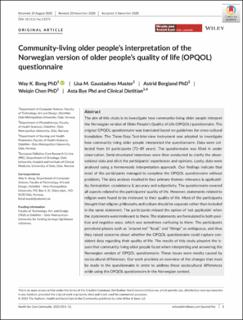| dc.contributor.author | Bong, Way Kiat | |
| dc.contributor.author | Gaustadnes, Lisa Mari | |
| dc.contributor.author | Bergland, Astrid | |
| dc.contributor.author | Chen, Weiqin | |
| dc.contributor.author | Bye, Asta | |
| dc.date.accessioned | 2021-12-01T12:41:54Z | |
| dc.date.available | 2021-12-01T12:41:54Z | |
| dc.date.created | 2021-01-14T08:11:33Z | |
| dc.date.issued | 2021 | |
| dc.identifier.citation | Health and Social Care in the Community. 2021, 29(6), 1695-1705 . | en_US |
| dc.identifier.issn | 0966-0410 | |
| dc.identifier.uri | https://hdl.handle.net/11250/2832362 | |
| dc.description.abstract | The aim of this study is to investigate how community‐living older people interpret the Norwegian version of Older People's Quality of Life (OPQOL) questionnaire. The original OPQOL questionnaire was translated based on guidelines for cross‐cultural translation. The Three‐Step Test‐Interview instrument was adopted to investigate how community‐living older people interpreted the questionnaire. Data were collected from 14 participants (72–89 years). The questionnaire was filled in under observation. Semi‐structured interviews were then conducted to clarify the observational data and elicit the participants’ experiences and opinions. Lastly, data were analysed using a hermeneutic interpretation approach. Our findings indicate that most of the participants managed to complete the OPQOL questionnaire without problems. The data analysis resulted in four primary themes: relevance & applicability, formulation, consistency & accuracy and subjectivity. The questionnaire covered all aspects related to the participants’ quality of life. However, statements related to religion were found to be irrelevant to their quality of life. Most of the participants thought that religion, philosophy and culture should be separate rather than included in the same statement. The participants missed the option of ‘not applicable’ when the statements were irrelevant to them. The statements are formulated in both positive and negative ways, which was sometimes confusing to them. The participants perceived phases such as “around me” “local,” and “things” as ambiguous, and thus they raised concerns about whether the OPQOL questionnaire could capture consistent data regarding their quality of life. The results of this study pinpoint the issues that community‐living older people faced when interpreting and answering the Norwegian version of OPQOL questionnaire. These issues were mostly caused by sociocultural differences. Our work provides an overview of the changes that must be made in the questionnaire in order to address these sociocultural differences while using the OPQOL questionnaire in the Norwegian context. | en_US |
| dc.language.iso | eng | en_US |
| dc.publisher | Wiley | en_US |
| dc.relation.uri | https://onlinelibrary.wiley.com/doi/full/10.1111/hsc.13273 | |
| dc.rights | Navngivelse-Ikkekommersiell 4.0 Internasjonal | * |
| dc.rights.uri | http://creativecommons.org/licenses/by-nc/4.0/deed.no | * |
| dc.title | Community-living older people’s interpretation of the Norwegian version of older people’s quality of life (OPQOL) questionnaire | en_US |
| dc.type | Peer reviewed | en_US |
| dc.type | Journal article | en_US |
| dc.description.version | publishedVersion | en_US |
| cristin.ispublished | true | |
| cristin.fulltext | original | |
| cristin.qualitycode | 1 | |
| dc.identifier.doi | 10.1111/hsc.13273 | |
| dc.identifier.cristin | 1871033 | |
| dc.source.journal | Health and Social Care in the community | en_US |
| dc.source.volume | 29 | en_US |
| dc.source.issue | 6 | en_US |
| dc.source.pagenumber | 1695-1705 | en_US |
| dc.relation.project | OsloMet - storbyuniversitetet: Funding strategic lighthouse initiatives. | en_US |

